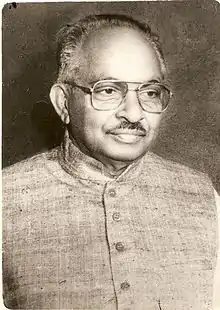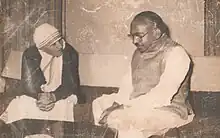K.M. Chandy (politician)
Kizhakkayil Mathai Chandy (6 August 1921 – 7 September 1998) was an Indian politician who served as the governor of the Indian states of Gujarat, Madhya Pradesh and the Union Territory of Pondicherry. He was also the former president of Kerala Pradesh Congress Committee (KPCC) and chairman of Rubber Board.
Kizhakkayil Mathai Chandy | |
|---|---|
 Prof. K. M. Chandy | |
| 8th Governor of Madhya Pradesh | |
| In office 30 December 1987 – 30 March 1989 | |
| Chief Minister | Motilal Vora Arjun Singh |
| Preceded by | Narayan Dutta Ojha (Acting) |
| Succeeded by | Sarla Grewal |
| In office 15 May 1984 – 30 November 1987 | |
| Chief Minister | Arjun Singh Motilal Vora |
| Preceded by | B. D. Sharma |
| Succeeded by | Narayan Dutta Ojha (Acting) |
| 6th Governor of Gujarat | |
| In office 6 August 1983 – 26 April 1984 | |
| Chief Minister | Madhav Singh Solanki |
| Preceded by | Sharda Mukherjee |
| Succeeded by | Braj Kumar Nehru |
| 7th Lieutenant Governor of Puducherry | |
| In office 15 May 1982 – 5 August 1983 | |
| Chief Minister | M. D. R. Ramachandran |
| Preceded by | R.N. Haldipur |
| Succeeded by | Kona Prabhakara Rao |
| President of the Kerala Pradesh Congress Committee | |
| In office January 1978 – May 1982 | |
| Preceded by | K. C. Abraham |
| Succeeded by | S. Varadarajan Nair |
| Personal details | |
| Born | Kizhakkayil Mathai Chandy 6 August 1921 Pala, Travancore, British India (Now in Kerala, India) |
| Died | 7 September 1998 (aged 77) Lisie Hospital, Ernakulam, Kerala, India |
| Political party | Indian National Congress |
| Spouse |
Mariakutty Chandy (m. 1939) |
| Children | 10 |
| Residence | Pala, Kerala |
| Alma mater | St. Berchmans College University College Thiruvananthapuram |
| Occupation | |
| Website | www |
As of 11 July 2020 Source: | |
He was elected unanimously to the State Legislature after Independence at the age of 26 and he was re-elected in 1952 and 1954. Chandy was mainly responsible for the establishment and growth of many big co-operative institutions in Kerala. The first ever Youth Congress Unit was started by him in the year 1953. He founded the Meenachil Co-operative Land Mortgage Bank. He was also the Founder of the Palai Co-operative Marketing Society. The Kerala State Rubber Marketing Federation was founded by him in 1971. He founded the Indian Rubber Growers Association in 1966. The present B. Tech. Course in rubber technology in the Cochin University is his brainchild. It was at his insistence that India joined the Association of Natural Rubber Producing Countries (ANRPC). He led a large number of delegations from India to conferences of International Rubber Study Group, Association of Natural Rubber Producing Countries (ANRPC), International Rubber Research Development Board held at London, Kuala Lumpur, Bangkok, Singapore, etc. from 1972 to 1978.[1]
Early life
K. M. Chandy was born on 6 August 1921 at Palai in Kottayam District as the son of Mariyam and Mathai of the Kizhakkayil family. He had 3 younger brothers including Pala K.M. Mathew (Former Member Of Parliament) and a sister.[2] He had his schooling in his home town Palai and College education at Changanacherry and Trivandrum. He completed his M.A. in English Language and literature in 1942.
Personal life
He was married to Mariakutty Chandy in the year 1939 at the age of 18. They have eight sons and two daughters.[3]
Path into Politics and Advocacy
Chandy's entry into the world of politics was marked by youthful zeal and an unwavering commitment to justice. During his tenure as an intermediate student at St. Berchman’s College in Changanacherry, he exhibited extraordinary leadership. At the tender age of 17, he orchestrated a courageous student uprising. This protest was in response to a brutal lathi charge on students in Trivandrum who had gathered to express their support for State Congress leaders. Despite the repercussions of expulsion, Chandy and his comrades were eventually reinstated, following a stirring mass Satyagraha at the college gates.
As he pursued his Honours course in English literature at Trivandrum, Chandy played a pivotal role in the establishment of the "Tagore Academy". This institution, founded under the guidance of the esteemed Gandhian leader Shri G. Ramachandran, aimed to infuse education with nationalist ideals. However, the academy's noble goals led to its prohibition in 1942 due to its association with fostering patriotic sentiments among students and youth.[4]
Involvement in the Freedom Movement
The year 1946 marked a significant turning point in Chandy's life, as he immersed himself in the fervor of the freedom movement. Serving as the Secretary of the Meenachil Taluk Congress Committee, his ardor for political activism attracted the attention of the state government. Responding to his growing influence, an official prohibitory order sought to curtail his involvement in political activities. However, his spirit remained unbroken, and he continued his unwavering commitment to the cause of freedom.
Chandy's dedication was put to the test when he was apprehended in July 1946. Though he secured bail from the High Court, his journey took a different trajectory as he was detained under the Defense of India Act. This period of detainment extended until the conclusion of September 1947, a poignant period of transition that coincided with India's attainment of independence.
Political Ascent and Significant Contributions
The dawn of India's independence heralded a new chapter in Chandy's political journey, characterized by remarkable achievements. At the remarkable age of 26, he was bestowed the honor of unanimous election to the State Legislature. This victory was but the harbinger of subsequent successes in 1952 and 1954. Chandy's affiliation with the Congress Party deepened, and he assumed pivotal roles such as Chief Whip in the State Assembly.
His imprint extended beyond legislative duties to encompass membership in the inaugural State Planning Board. Additionally, he played a prominent part in the State Minimum Wages Advisory Board, where he contributed to the formulation of equitable minimum wage standards across diverse industries. Long before the Indian National Trade Union Congress (INTUC) was established, Chandy's pioneering efforts led to the organization and leadership of Trade Unions under the banner of "THOZHILALI".[5]
Influence on Kerala Pradesh Congress Committee (KPCC)
Chandy's commitment to the Congress Party was profound and enduring. His influence within the Kerala Pradesh Congress Committee (KPCC) was instrumental in shaping the party's trajectory in the state. He embarked on a journey within the ranks of the KPCC in 1948, a journey that spanned decades and left an indelible mark on the party's history.

He assumed the mantle of General Secretary of the KPCC from 1963 to 1967, a period marked by his strategic vision and organizational acumen. Chandy's leadership was characterized by a commitment to democratic processes within the party, even in times when committee sizes were far more modest than they are today. He played a pivotal role in guiding the KPCC through challenges and charting a course aligned with the party's principles.
Chandy's dedication extended to financial stewardship as he assumed the role of Treasurer of the KPCC from 1967 to 1972. His ability to manage party finances with transparency and integrity bolstered the party's credibility among its supporters and the public at large.[6]
Reviving Congress in Kerala
In January 1978, Chandy's indomitable spirit led him to resign from the Chairmanship of the Rubber Board to take up the monumental challenge of revitalizing the image of the Congress Party in Kerala. At a time when many had distanced themselves from Indira Gandhi's leadership, Chandy undertook the arduous task of rejuvenating the party's fortunes. His visionary leadership played a pivotal role in the resurgence of the Congress in Kerala after a prolonged hiatus.
Under his stewardship, the Congress triumphantly returned to power in Kerala, marking a significant victory for the party. This resurgence was a testament to Chandy's strategic prowess, organizational skills, and deep-rooted connection with the people of Kerala.[7]
A Statesman's Path and the Role of Governor

Chandy's illustrious journey within the Congress Party culminated in a multifaceted role as a statesman. His exceptional leadership, unwavering commitment, and distinguished service were recognized by none other than Mrs. Indira Gandhi, the indomitable Prime Minister of India. With her unyielding trust in his abilities, Chandy was bestowed with a series of significant gubernatorial appointments that added new dimensions to his already remarkable legacy.
Pondicherry: Navigating a Unique Territory
Taking on the role of Lieutenant Governor of Pondicherry on May 15, 1982, Chandy stepped into the unique challenge of overseeing this Union Territory. With his characteristic dedication, he navigated the intricate landscape of governance, addressing the specific needs of Pondicherry's populace and working towards the upliftment of the region.
Gujarat: Guiding a Vibrant State
On August 6, 1983, Chandy assumed the mantle of Governor of Gujarat. This role placed him at the helm of a dynamic and industrially significant state. During his tenure, he exhibited a keen understanding of Gujarat's diverse socio-economic fabric and guided the state towards progress and harmony.
Madhya Pradesh: Championing Reform
From May 15, 1984, to March 30, 1989, Chandy served as the Governor of Madhya Pradesh. Here, he embarked on a transformative journey to reform and rectify the educational system. His commitment to eliminating corrupt practices and ensuring the integrity of university examinations left an indelible mark on the state's academic landscape.
Indira Gandhi's Vision and Trust
Throughout his tenure as a governor, Chandy remained true to his principles of transparency, accountability, and service. His ability to align his governance with the ideals of progress and social justice resonated deeply with Mrs. Indira Gandhi's own vision for India. It was this alignment that led her to entrust him with these important responsibilities.[8]
Death
On September 7, 1998, Prof. K.M Chandy's earthly journey concluded, leaving behind an enduring legacy that encompasses his remarkable contributions to co-operatives, education, politics, and his roles as a governor. His life story continues to reverberate throughout Kerala and beyond, a testament to his exceptional leadership and the mark he left on Indian governance. [9]
Biographies
He couldn’t complete his autobiography titled "Jeevitha Vazhiyorakazhchakal" due to his sudden death, but later it was published by Labour (India) publications in 1999 after his death.
A biography on him titled "Varika Varika Sahajare" was written by Pala K.M. Mathew published by Current Books in 2009.[10][11][12][13][14]
References
- "Prof. K.M. Chandy". Rajbhavan Gujarat (Govt. of Gujarat). Retrieved 16 May 2012.
- "Genealogy of Prof. K.M. Chandy". Roots-The Kerala Christian Family Tree.
- "Prof. K.M. Chandy(personal details)". Roots. Retrieved 12 June 2020.
- "Leadership on Student Satyagraha". Asianet News Channel. Retrieved 21 August 2023.
- "Prof. K.M. Chandy(Travancore legislative History)". KM CHANDY FOUNDATION. Retrieved 21 August 2023.
- "Kpcc leadership". KM CHANDY FOUNDATION. Retrieved 21 August 2023.
- "Political Life of Prof.k.m chandy". Manorama News Channel. Retrieved 21 August 2023.
- "Prof. K.M. Chandy's Connection with Indira Gandhi on Asianet News". Asianet News Channel. Retrieved 21 August 2023.
- "Prof. K.M. Chandy(Life History)". KM CHANDY FOUNDATION. Retrieved 21 August 2023.
- "Prof. K.M. Chandy". Rajbhavan Madhya Pradesh (Govt. of Madhya Pradesh). Retrieved 16 May 2012.
- "Three instances when Governors didn't buckle under pressure". National Herald India. Retrieved 9 December 2019.
- "Interview with Prof. KM Chandy (Freedom fighter, Congress leader,MLA,State Governor)". YouTube.
- "Bio-data of Prof.K.M Chandy". Prof.K.M Chandy Foundation. Retrieved 10 July 2020.
- "K.M. Chandy award for best rubber grower". The Hindu. 15 October 2020. Retrieved 8 October 2020.